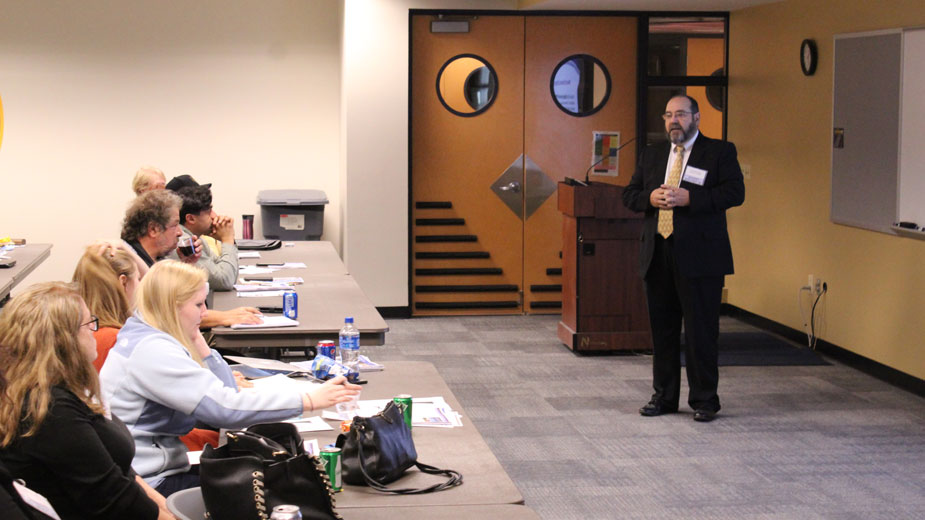State Designations Bring Business Opportunities
CHAMPION TOWNSHIP, Ohio – With more than $773 million in projected expenditures for the current fiscal year – ranging from employee apparel to IT services to promotional supplies – the state of Ohio has plenty of opportunities available for businesses to grow.
And for businesses owned by women, minorities and veterans, the chances are even greater as agencies are required to set aside portions of their spending for those with certain registrations: Minority Business Enterprise, Veteran Business Enterprise or Encouraging Diversity, Growth and Equity.
How to register for the programs and what benefits they bring were among the topics at Friday’s Warren Business Development Day, hosted by state Rep. Glenn Holmes, D-63 Girard, and the Ohio Department of Administrative Services at Kent State University at Trumbull.
“If a larger business captures a corner of the market, it causes those small businesses to be shut out. They need to be vibrant too,” Holmes said. “There’s a certain percentage of what the state spends on goods and services that’s there for [underutilized segments] and if they can tap into that, then we should be doing that.”
For the Minority Business Enterprise program, or MBE, businesses must be at least 51% owned by a person of color – African American, Hispanic, Asian, or Native American – who is a full-time Ohio resident and has day-to-day control and industry expertise. The business must also have been in operation for at least a year.
After registering through the Ohio Business Gateway portal and being accepted into the program, businesses have access to a sheltered bidding process – all state agencies must spend up to 15% of their procurement budget with MBE-certified businesses – as well as development programs such as the Minority Business Bonding Program or Minority Business Direct Loan Program.
While only applicable to the Department of Administrative Services, which oversees bidding for purchases valued at more than $50,000, and the Department of Transportation, the Veteran Business Enterprise, or VBE, designation are given a 5% leeway on bids – for example, winning on a contract bid of $1,050 if the overall lowest bid is $1,000.
To be eligible for the VBE designation, business must meet one of four criteria: be at least 51% owned by a veteran or active duty service member, at least 10% of employees are veterans or active duty, at least 51% of the board of directors are veterans or active duty or be certified as the U.S. Department of Veterans Affairs as a Veteran-Owned Small Business.
Finally, the Encouraging Diversity, Growth and Equity, or EDGE, program, provides opportunities for spending with state agencies, boards and commissions, each of which have program-expenditure goals they must meet. Many of the eligibility requirements are the same as the MBE, but it is open to businesses that are at least 51% owned by socially disadvantaged classes, based on race, gender and disability status. It’s also open to businesses in an Enterprise Zone, which includes parts of Mahoning, Trumbull and Columbiana counties. The program has a 10-year cumulative limit, as well as a $750,000 caps on personal net worth during enrollment.
Upon being accepted into one of the programs, businesses are put into a searchable database, used by both state agencies and large private companies, such as DuPont, said Todd McGonigle of the Department of Administrative Services’ Equal Opportunity Division.
“Keep in mind that 40% of state purchasing now is $50,000 or less. State agencies are allowed to no-bid up to $2,500,” he said. “When you get certified, you’re put into a database that all state agencies use to find what MBEs are selling the items. If you’re one of them, they’ll call you.”
When registering with the database, it’s best to be as specific as possible when putting in what goods and services you provide, he noted. Each business is given an index of United Nations Standard Products and Services Codes, or UNSPSC.
“There’s 83,000 of these that tells us what you sell. If you sell food products, it goes down to frozen peas,” he said. “When you list the nature of your business, make it as detailed as possible. If you sell office supplies and put that in, but someone’s searching for three-ring binders, they’ll put that in and you won’t come up.”
A full list of state agency expenditure projections, as well as the designated contact for businesses enrolled in the MBE and EDGE programs, was available at the seminar and an online version is available here.
“You go through the booklet and look up ‘pencils’ to see what state agencies are buying pencils. That should be your very first marketing contact,” McGonigle told the crowd Friday. “You’ll get in touch with them and they’ll tell you what they’re purchasing, when, what the bid is going to be and whether it’s a contract or they’ll just pick up the phone and ask you to send them.”
Bids normally fall into two categories, explained Tonya Prickett, a procurement manager for Administrative Services: invitation to bid, or ITB, and request for proposal, or RTP. While the contract winner for an ITB is determined by the lowest price, RTP winners are determined by “the best solution for the agency. The RTP also allows the opportunity for negotiation,” she said.
The seminar also touched on business-development topics, such as forming a joint venture and social media.
For joint ventures, noted Donald Stinson of the Equal Opportunity Division, those that are at least 51% owned by MBEs are still eligible for the 15% set-aside with state agencies, while the threshold for EDGE businesses is 30%. Joint ventures, while they must be created for a specific project, can get the legwork done in advance and await a contract before a trigger clause officially creates it, he noted.
“Most of the time, larger companies are more advanced, have more knowledge and know how to do things better than you. How much is having more experience worth to you? That’s why joint venturing is important,” he said. “You gain knowledge, information, how they operate. You may get new ideas from how they do things. You build relationships.”
When it comes to social media, said DAS program administrator Bobbi Bell-Bartholomew, it’s important for businesses to have an idea of their audience before getting started.
“Social media has a larger role in small businesses because they don’t have that marketing budget. Their social media presence can dictate how their business grows,” she said. “It’s about knowing who your audience is. What are you selling? Who are you selling to and trying to reach? Are there professional organizations you should be moving into?“
The state has plenty of resources available, she added, for small businesses of all sorts, through agencies like the Small Business Development Center or Procurement Technical Assistance Center. The purpose of the Business Development Day seminars, she explained, is to let businesses know what’s available to them and how to find the right information.
“The state has a lot of resources, many of them available for free or low cost. We want to give businesses the tools to grow,” she said. “But if they’re unaware of what’s available, they may not be able to do so.”
Pictured: Todd McGonigle of the Ohio Department of Administrative Services speaks at Warren Business Development Day.
Copyright 2024 The Business Journal, Youngstown, Ohio.



